Special Feature: UNODC Conversations
Sarod Maestro Ustad Amjad Ali Khan: "Disturbed by extremism and violence in society today."
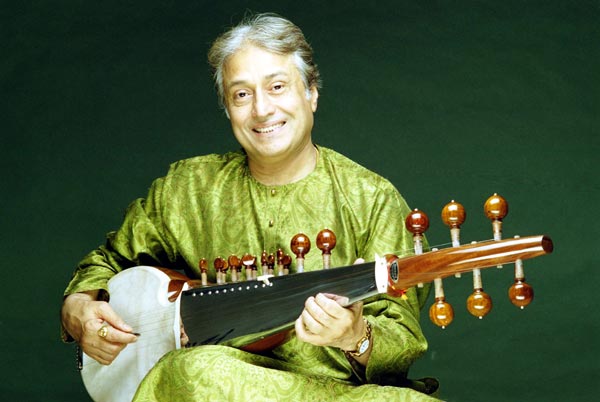
New Delhi, March 06, 2018: In an exclusive interaction with UNODC Regional Office for South Asia, distinguished Indian classical music exponent and sarod legend Ustad Amjad Ali Khan expresses concern over extremism and violence in the society today, and calls for harmony and peace.
Excerpts from the Interview
Q: Khan sahib, you have been enthralling generations of Indians with your soul-stirring music since the past many decades. With your mastery of the sarod, you are of the most distinguished and illustrious icons of Indian classical music. Please tell us how did your tryst with music begin, and how has your journey been so far?
 Ustad Amjad Ali Khan: I am very fortunate that I was born in a family of musicians. My forefathers came from Afghanistan and settled in Madhya Pradesh. My father, Ustad Hafiz Ali Khan sahib of Gwalior was my guru and my mother was Rahat Jahan Khan.
My father was considered the poet and prophet of sarod: he was bestowed with the title of
Aftab-e-Sarod. I was not a child prodigy, but from a young and early age I was pushed on the stage, which helped me learn how to face the audience. From childhood, the atmosphere around me was filled with music, and all my elder brothers and uncle nurtured me and taught me. My formal journey in music began when I was invited to play at the Sadarang Music Conference in Calcutta in 1958. Since then, I have received love and respect from every corner and every state of India. It is my own country, India, which has made me what I am today.
Ustad Amjad Ali Khan: I am very fortunate that I was born in a family of musicians. My forefathers came from Afghanistan and settled in Madhya Pradesh. My father, Ustad Hafiz Ali Khan sahib of Gwalior was my guru and my mother was Rahat Jahan Khan.
My father was considered the poet and prophet of sarod: he was bestowed with the title of
Aftab-e-Sarod. I was not a child prodigy, but from a young and early age I was pushed on the stage, which helped me learn how to face the audience. From childhood, the atmosphere around me was filled with music, and all my elder brothers and uncle nurtured me and taught me. My formal journey in music began when I was invited to play at the Sadarang Music Conference in Calcutta in 1958. Since then, I have received love and respect from every corner and every state of India. It is my own country, India, which has made me what I am today.
Q: What makes sarod, as an instrument, so special?
Ustad Amjad Ali Khan: Sarod is a very precious gift of God to the world. Sarod was modified by my forefathers from the instrument called rabab. Rabab still exists in Afghanistan, Kashmir and Central Asia. Rabab has a very dull set tone, there is no vibration and you cannot express the very subtle nuances of singing. There was always a reason when instruments were created: what the veena could not express, sitar did. What the rabab could not express, sarod did. Sarod is a Persian word, which means music. It was a big taboo to play any song on the sarod. Historically, sarod players dealt with grammar, literature, but the level of poetry was missing in this beautiful instrument. From childhood, I was listening to sarod around me, but I wanted to be more expressive. I found sarod was very limited, especially when I heard the sarod and the sitar being played together. Sitar could express very fast phrases, which the sarod could not do. Sarod does not have frets or bars like the guitar or the sitar has. It just has a fingerboard is made of slippery steel and does not have any sign of any note. To bring out the human expressions, the strings is pressed with the edge of the fingernails. By the grace of God, sarod has become very expressive today. My sons, Amaan Ali Bangash and Ayaan Ali Bangash are more expressive, multidimensional and multifaceted, and are the seventh generation sarod players in our family.
Q: One of your greatest contributions has been to attract youth and new audiences to the realm of Indian classical music. How do you engage with the youth through your music?
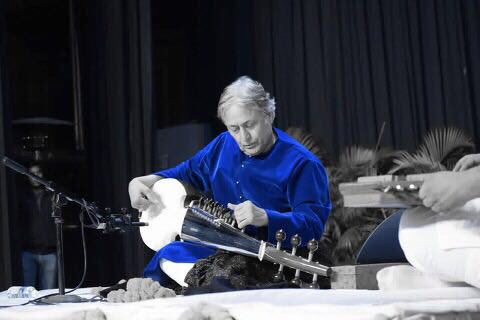 Ustad Amjad Ali Khan: I studied at the Modern School in Delhi, and was fortunate to have a principal like Mr. M.N. Kapoor. In my school days, I regularly performed on Founders' Day. I used to entertain my school friends by playing film songs, which everyone knew and grew up listening to. I have always enjoyed interacting with students. In all these years, I have been invited to most schools and colleges across India and I am always available to perform for students and the youth around the world. I also love to do residencies while travelling abroad. I was at the Stanford University for two months, teaching music. Similarly, I have taught music at Indiana University, Washington University and York University. My students belong to all kinds of genres: violin players, cello players, opera singers, conductors and composers.
Sarod is a difficult instrument to learn or to teach, but I love to teach music. I don't know how I play, but yes, the youth of India and the world is connected with me and Amaan, and Ayaan. When we are on the stage, we just try to connect ourselves to the audience, and make them happy and at peace.
Ustad Amjad Ali Khan: I studied at the Modern School in Delhi, and was fortunate to have a principal like Mr. M.N. Kapoor. In my school days, I regularly performed on Founders' Day. I used to entertain my school friends by playing film songs, which everyone knew and grew up listening to. I have always enjoyed interacting with students. In all these years, I have been invited to most schools and colleges across India and I am always available to perform for students and the youth around the world. I also love to do residencies while travelling abroad. I was at the Stanford University for two months, teaching music. Similarly, I have taught music at Indiana University, Washington University and York University. My students belong to all kinds of genres: violin players, cello players, opera singers, conductors and composers.
Sarod is a difficult instrument to learn or to teach, but I love to teach music. I don't know how I play, but yes, the youth of India and the world is connected with me and Amaan, and Ayaan. When we are on the stage, we just try to connect ourselves to the audience, and make them happy and at peace.
Q: What are some of the greatest social challenges that you feel strongly about? Do you feel disturbed by the prevailing tensions in our society today?
Ustad Amjad Ali Khan: I always thought that 21 st century will be most peaceful, most harmonious because of technological achievements by human beings. But with all due respect to education, education has failed to create kindness and compassion in human beings. Even in the 21 st century, we are still killing each other on account of religion. I don't understand how can PhDs and scholars be radicalized? So what have we really achieved? I feel very sad to hear that so many people were shot recently in America, in Las Vegas, where a man killed several hundred people. I was very sure the next day President Trump will ban the gun culture in America. But I am absolutely shocked to hear the recent announcement of President Trump that he wants every school teacher to carry a gun to face the problem. Guns create problems, guns kill people, guns destroy culture. Guns cannot protect or save lives. America has achieved so much in the past decades, and we expect from President Trump to think seriously about the future generations. Children of America are killing each other and guns and weapons should be banned immediately.
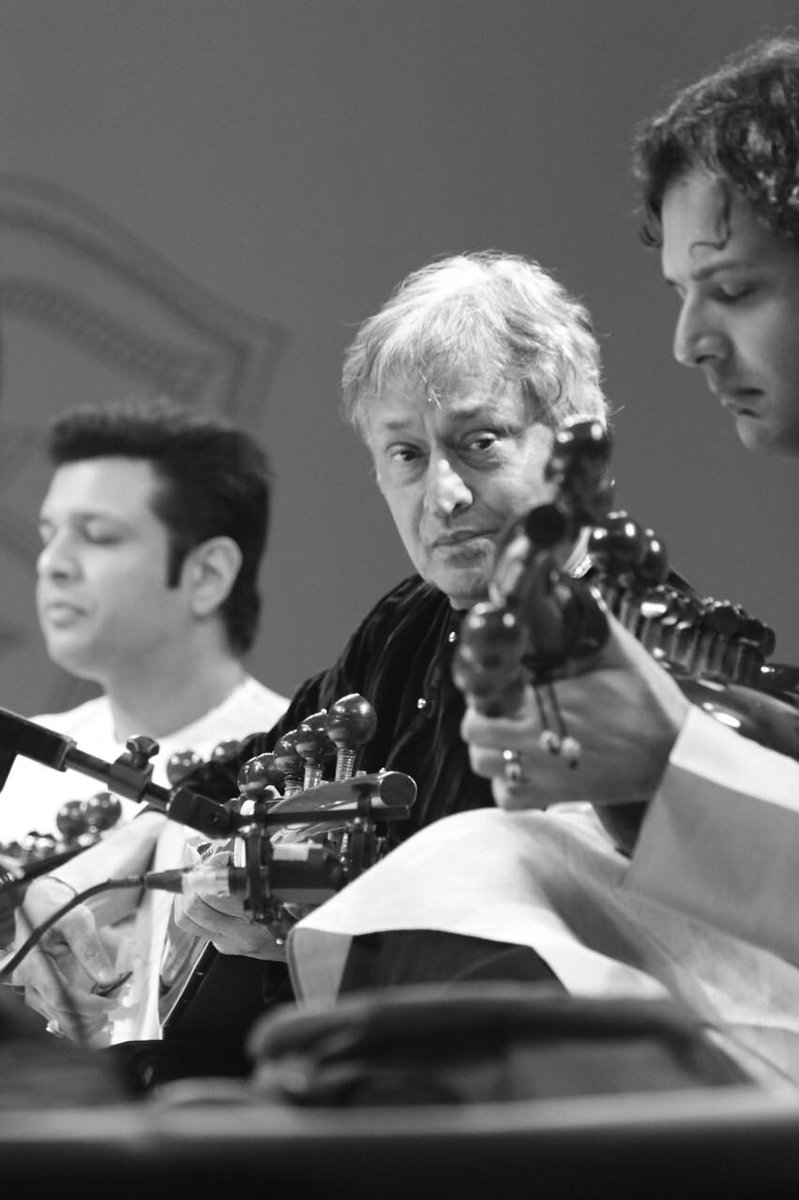
My father often said that we have a common God and we are a common race. Definitely we have a common God, because we come and go in the same way in this beautiful world. I wish this message was conveyed by the religious leaders of every faith, but they are busy in their own agendas and do not convey the truth of life to the people of the world. Every religion is trying to say that they are the best faith. But all religions were created by human beings for their own vested interests or to help their community. We are suffering on account of religion. Every day, we hear of people killing each other because of religious or political differences. Today's human being has become the most dangerous, most ferocious animal.
Unfortunately, the base of all political parties is religion. I feel very helpless. Especially in India, everytime there are elections, people play shatranj (chess) with the sentiments of every religion. India is more complicated as far as religion is concerned, with castes and sub-castes. I very strongly feel that election is a game of manipulation, those who can manipulate win the election, and those who cannot, lose the election. Politics has become a profession and that is not a healthy sign for our country. In our country, we need people like Mahatma Gandhi, our freedom fighters who gave up their lives for the peace and harmony of India.
Q: Can music help heal these wounds?
Ustad Amjad Ali Khan: In Hindi, we say 'Aatma hi parmatma hai'. There is another expression with a beautiful meaning, ' swar hi ishwar hai'. Music has connected the world, whether it is European music, Indian music, folk music. At this age and stage of my life, I have realized that the purest form of music is sound--the sound of symphony, sarod, sitar, cello, violin, guitar, or human expression-with all its slides and glides. Pure sound is very healing: doctors and the medical world are using music as a therapy. Music has connected the world and is a medium to foster peace and international understanding.
Q: Khan sahib, besides being an exponent of music, you are also a revered teacher and a mentor. What do you think about how we, as a society, have fared with respect to children?
Ustad Amjad Ali Khan: Collectively, we all have to plan, save and guide the future of young children. Children today are connected with so many electronic gadgets today--be it the ipad, cellphones, laptop and television-which is very unhealthy for any child of any country. I think there is something wrong in our education system: I strongly feel every school should have a class where children should not carry books inside. In every class, teachers should share the meaning of love, compassion, kindness, surrender and salutations like "sashtang namaskar". In every school, be it US, India or Europe, the system of teaching has become very mechanical, and children are treated not as students but as clients. Same thing is happening in hospitals, where patients are treated as clients. Attitude of humans towards each other is becoming commercial and self-centred, which is not good for the coming generations.
Q: Coming to social issues, drug use has emerged as a major issue of concern, especially among the youth. Many Indian states, including Punjab, Delhi and Northeast India are facing a drug epidemic. What do you feel about this increasing drug abuse by Indian youth?
Ustad Amjad Ali Khan: I feel helpless to see our youth falling prey to drug use. It impacts health and well-being of not only the individual but also their family, community and society at large. I appeal to the youth to stay away from drugs and instead utilize your talents and energy in gaining new knowledge and skills. Pursue music, or painting or sports, or a passion you enjoy, and see how beautiful life can be! I support UNODC's 'Listen First' campaign, which calls for extending a patient ear to children and the youth, to help them help themselves and say no to drugs. I agree that is the first step to address the problem.
Unfortunately, drug use has always been in our culture, historically: charas, ganja, hashish etc. In the west too, the hippie culture was associated with drugs like marijuana. We must not forget that drugs were created by humans, and unfortunately, there are people in the world who do not care about the safety of other human beings. Money has become like God, and increasing commercialization and selfish attitudes are causing people to kill fellow beings. Those who are making and selling drugs must understand that they are killing young children and adults through their nefarious actions, and must be punished.
Q: Increasingly, young boys and girls are falling prey to organized crime and becoming victims of sexual violence, radicalization, drug use, human trafficking, stress and suicides etc. How can music be used to help vulnerable youth from the world of crime?
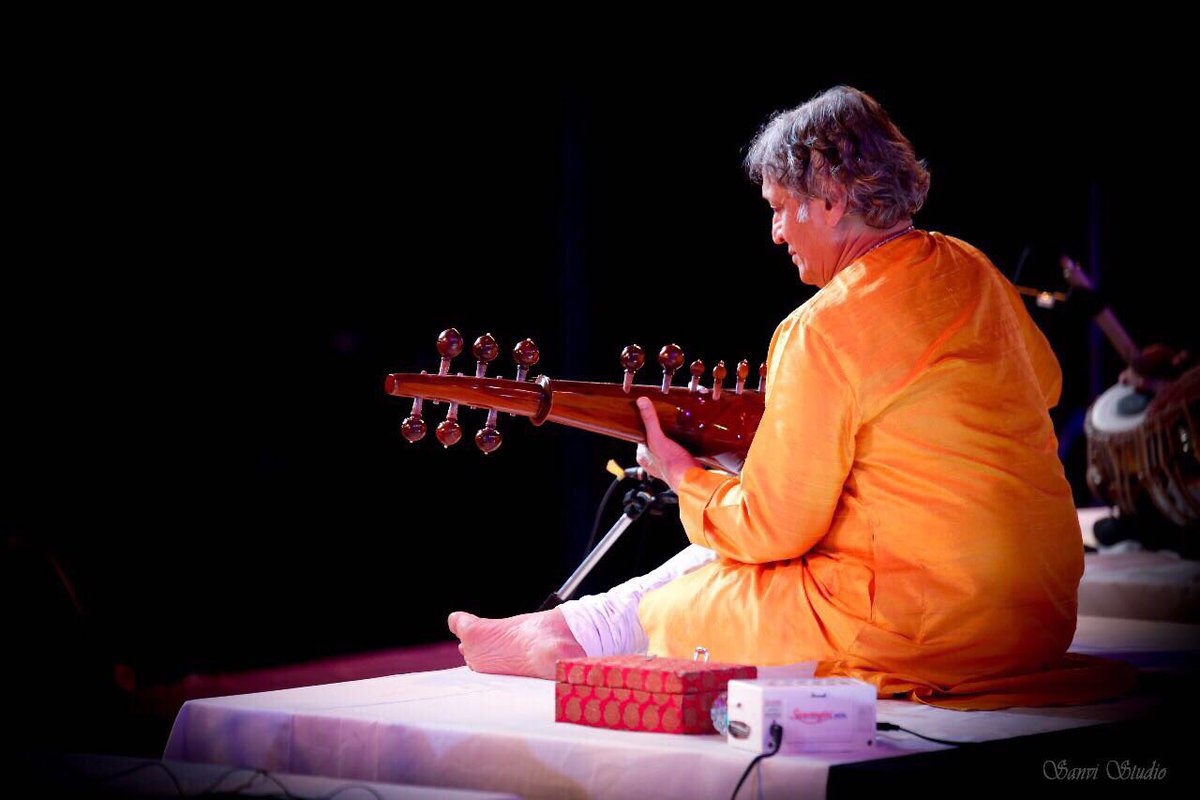 Ustad Amjad Ali Khan: See, music alone cannot control crime or fight with the criminals. Crimes and criminals are created by the society. For instance, in every country, we have street children, who are either victims of crime or perpetrators of crime themselves.
I think the world needs more compassionate and kind people, like those who are trying to save the future and end child trafficking. Even today, people who are slaves to their desires and habits are buying children, young boys and girls. It is very unfortunate.
Ustad Amjad Ali Khan: See, music alone cannot control crime or fight with the criminals. Crimes and criminals are created by the society. For instance, in every country, we have street children, who are either victims of crime or perpetrators of crime themselves.
I think the world needs more compassionate and kind people, like those who are trying to save the future and end child trafficking. Even today, people who are slaves to their desires and habits are buying children, young boys and girls. It is very unfortunate.
My father used to say that tolerance, kindness and patience is the greatest prayer. Anyone who is fond of music, or listen to music with concentration, will receive the positive effect of music in their life. The seven notes of music are deeply connected with our mind. If you can sing them with focus and clarity, you will feel at peace with your surroundings. I wish every school made the children sing the seven notes, instead of any religious or patriotic songs-it will help them become more peaceful human beings.
I believe that listening to pure instrumental music--which is music without any language or lyrics-even for 10-20 minutes a day can have a tranquil effect on the mind. It has a very positive effect, and can help even those with criminal tendencies in becoming more kind and compassionate.
Music is a precious gift of God and like the seven elements, does not belong to any religion. Think about it: the same seven notes form all music and songs we know today. All the shlokas, mantras, azaan, hymns, carols and every other type of religious music are based on the same seven musical notes. It is the greatest message of universal oneness and unity!
Q: The world today is plagued by religious and social tensions, extremism and terrorism. Polarization and radicalization of people over imagined differences is on the rise. How do we foster peace?
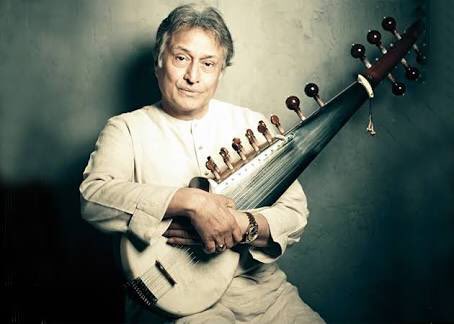 Ustad Amjad Ali Khan: You see, nobody has time for global harmony and peace. Though every head of the country talks of peace and harmony, they continue to produce the most dangerous weapons, bombs and missiles. I wonder how many really mean what they say when they talk of peace and harmony. People are only worried about their own power and position: whether it is politicians, bureaucrats or businessmen. Every politician has a different idea and agenda of how to rule the world. We keep hearing about the damages to the environment, changes in the weather and the climate, and air and noise pollution, but what is actually being done to address these problems?
Ustad Amjad Ali Khan: You see, nobody has time for global harmony and peace. Though every head of the country talks of peace and harmony, they continue to produce the most dangerous weapons, bombs and missiles. I wonder how many really mean what they say when they talk of peace and harmony. People are only worried about their own power and position: whether it is politicians, bureaucrats or businessmen. Every politician has a different idea and agenda of how to rule the world. We keep hearing about the damages to the environment, changes in the weather and the climate, and air and noise pollution, but what is actually being done to address these problems?
It is equally difficult to reduce tensions among religions and foster peace and harmony. Certain countries are ruining the future of their children by injecting hatred on account of religion. Children are also targeted and are victims of radicalization and extremism. It is something that the citizens of the world have to deal with and take matters in their own hands.
Q: Khan sahib, we are extremely honoured to have your support. Please share your thoughts on UNODC's work in South Asia.
Ustad Amjad Ali Khan: I am very proud and happy to see your commitment and dedication towards mankind. I am very happy to be associated with UNODC, and it is my great honour and pleasure to be a part of your activities. My family and I are always with you, and look forward to working together for justice, security and health of the people. I wish UNODC achieves all its goals and mandates, and I extend my full support to its efforts against transnational organized crime.
(As told to Samarth Pathak , Communications Officer, UNODC Regional Office for South Asia )